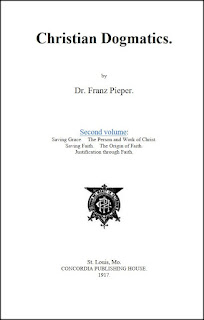If one reads conservative Christian commentary on the Internet, one will likely come across the writings and media presentations of Dr.
Albert Mohler of the Southern Baptist Theological Seminary, which is
an institution of the Southern Baptist Convention, essentially Reformed in its doctrine. Much of his commentary is encouraging for its defense against the anti-Christian policies being promoted or enacted within the United States. He was especially inciteful for publicizing to a wider audience the events happening in West Lafayette, Indiana in 2022. The city council was debating an ordinance that could impact Christian counseling against sexual sin, in this case the so-called "transgenderism". One may read his
Jan. 19, 2022 "The Briefing", a local
television report of a city council meeting, and a
World Magazine report of the same city council proceedings. The "Christian counseling" method under indirect attack was, as reported by
World, "popularized by the late Presbyterian pastor
Jay Adams." I personally was under this type of counseling for a period of time over 25 years ago, but later discovered its
Calvinist basis, since Adams explicitly taught against Universal Justification. In his 1970 book
Competent to Counsel, p. 70, Adams states (emphasis mine)
:"As a reformed Christian, the writer believes that counselors must not tell any unsaved counselee that Christ died for him, for they cannot say that."
That is pure Calvinism which teaches "Particular Grace". So I had to leave this counseling, for what good is it if they withhold the Gospel because they are not sure if I am saved or not. Admittedly there was some benefit for me, but not for my Christian faith. I had to return to Lutheranism for my assurance of salvation. The Gospel is, at its core, Universal, Objective Justification (UOJ), 2 Cor. 5:19, John 3:16.
But this blog post addresses a very surprising phrase that Dr. Mohler used in
his Jan. 19 "Briefing" (emphasis and highlight is mine):
"Biblical counseling emerged as an intentional effort to reject the integrationism that claimed you could combine humanistic secular psychology and biblical truth, and instead to counsel just on the basis and on the authority of biblical truth. And biblical counseling doesn't seek licensure, programs like the one at Southern Seminary and at Boyce College, do not lead to the seeking of certification by the state. We're not looking for state licensure, we're looking to equip Christian churches and Christian ministers to conduct truly Christian counseling on an authentically biblical basis. The biblical counseling movement is very well represented by this church in this Indiana town. It is operating on the basis of its own biblical convictions and it understands counseling rightly, not as seeking some form of therapeutic intervention by psychology or psychiatry.
That is not the church's proper role. The church's role is to apply what is preached in the pulpit, in the lives of individual Christians, helping them to make connections and application by the sufficiency and authority of the Word of God so that their lives are conformed to obedience to Christ. And thus, by the power of the Holy Spirit in the means of grace, our lives are conformed as Christians to Christ, to Christ's likeness.
"VII. Baptism and the Lord’s Supper
Christian baptism is the immersion of a believer in water in the name of the Father, the Son, and the Holy Spirit. It is an act of obedience symbolizing the believer’s faith in a crucified, buried, and risen Saviour, the believer’s death to sin, the burial of the old life, and the resurrection to walk in newness of life in Christ Jesus. It is a testimony to his faith in the final resurrection of the dead. Being a church ordinance, it is prerequisite to the privileges of church membership and to the Lord’s Supper.
The Lord’s Supper is a symbolic act of obedience whereby members of the church, through partaking of the bread and the fruit of the vine, memorialize the death of the Redeemer and anticipate His second coming."
No "means of grace" here, only Reformed doctrine that denies the God-given Sacraments as "means of grace" They are only "act(s) of obedience" and performed to "memorialize". — While we appreciate Dr. Mohler's news and analysis on many issues of our day, yet he cannot escape the fact that his doctrine, confessed as a Southern Baptist, calls into question, i.e. destroys, the very doctrines that he otherwise professes: Grace Alone, sola gratia.
Dr. Albert Mohler is a
Baptist, not a
Lutheran, in his confession, and so is being disingenuous by using the term "means of grace" when he actually means no such thing. The use of the term will certainly confuse some Lutherans into thinking there is no real difference, when it actually concerns, what
Franz Pieper calls, "The
Foundation of the Christian Church".



.jpg)
.jpg)
%20crop2.jpg)
.jpg)
%20crop2.jpg)
.jpg)
%20crop2.jpg)

.JPG)




